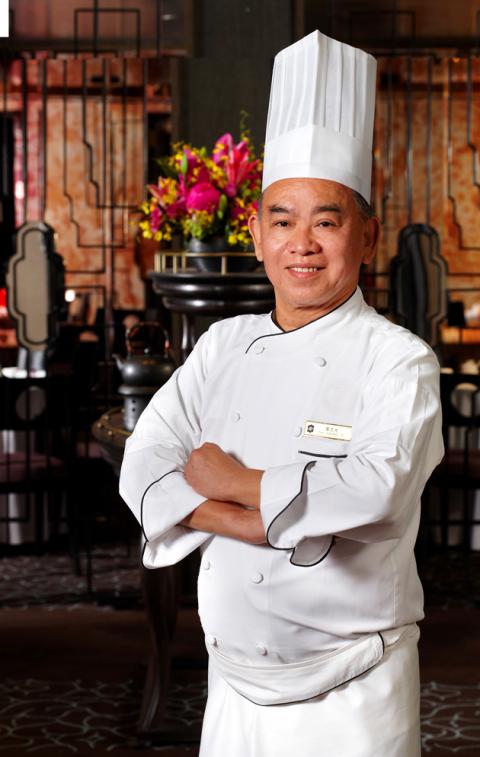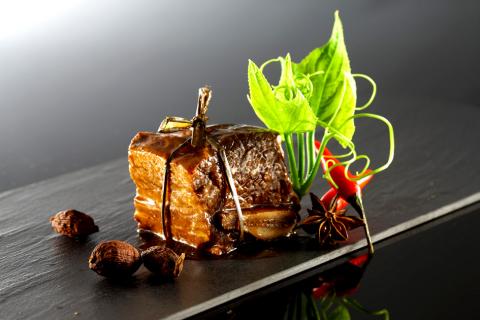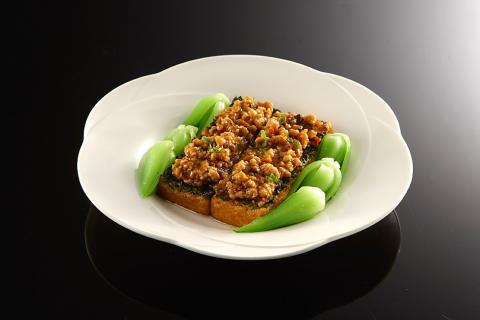Cantonese cooking is probably the best-known style of Chinese cooking around the world. It is also a culinary style steeped in tradition, a tradition that Chef Ip Chi-kwong (葉志光), who joined the Shangri-La’s Far Eastern Plaza Hotel in Taipei as Executive Chinese Chef last year, sees as in danger of being lost in the rush to make money. Chef Ip has worked all over the world, cooking for national leaders and celebrities. His combination of old-school discipline and exposure to modern culinary trends has made him an icon of what is sometimes termed “modern Cantonese cuisine” (新粵式料理), a style of preparation that suits contemporary concerns about health and fitness, but retains the ancient heritage of this venerable cuisine.
Ip worked through the old apprentice system, spending years honing basic skills, skills that he regards as the foundation of creating authentic Cantonese food. Speaking with the Taipei Times over lunch at the Shangri-La’s Far Eastern Plaza Hotel, he said that the tradition of Cantonese cuisine was in danger of being lost, as a new generation of chefs were in too much of a hurry to master the fundamentals.
Dapper in his chef’s whites, Ip shook his head as he spoke of a new generation of chefs who didn’t have the depth of knowledge that can only be built up over many years working under established masters.

Photo courtesy of Shangri La Far Eastern Hotel
BACK TO BASICS
“Many chefs do not train for long enough,” Chef Ip said. “They leave (to open their own restaurants) before they have reached the level of master. Many chefs are now so young, but they don’t know enough … Cooking is like learning Shaolin kungfu. You must follow a master for many years, learning little by little, mastering all the fundamental skills.”
He added that a chasm has opened up between the old and the new generation. “Even in Hong Kong, the situation is very serious. In the 1980s, people were not coming over from China anymore and it was difficult to find people to work in kitchens. Hong Kong people didn’t want to train as chefs. They didn’t like the long hours and thought of it as dirty work. There was a great shortage of chefs, so many young people rose up quickly [to senior positions or to open their own restaurants]. By the 1990s, many of these chefs were using ready-made products in their food. Cooking for them had become little more than putting various things together,” he said. “This food has no soul.”

Photo courtesy of Shangri La Far Eastern Hotel
Ip said that when he first arrived in Taipei, he checked out many of the local Cantonese establishments, and noticed the same thing: the soullessness of the food. For Ip, soul comes from making things from scratch, down to the most fundamental ingredients such as stock and sauces.
“All the sauces they just bring them back [from Hong Kong]. Everything they made was actually just other people’s products. It was never really their own,” Ip said. As head of the Chinese kitchen at Shangri-La’s Far Eastern Plaza Hotel, Ip enforces a strict regime of painstakingly making his complex stock daily. He also makes his own tofu and many of his sauces, such as his handmade XO sauce.
“It is all about making the effort,” Ip said, and working in his kitchen requires a great deal of effort. According to Tricia Chen (陳韻如), Far Eastern Plaza Hotel’s assistant communications manager, staff turnover in Ip’s kitchen is high due to the demanding work conditions.

Photo courtesy of Shangri La Far Eastern Hotel
But Ip is unrepentant. “If the young cooks can learn just 40 percent of what I have to teach, they can go out and open a restaurant,” he said. “Most aspiring chefs are just too lazy. They are happy if a dish simply tastes okay.” For Ip, okay is not enough.
CANTONESE CONTEMPORARY
Ip says that making things from scratch also allows him to ensure that his dishes are healthier and in keeping with contemporary thinking about the use of oil and salt. “Many Cantonese chefs in Taipei are still cooking in the style of the 1970s, using lots of oil and salt, but Cantonese cuisine has moved on,” he said.
Ip joined a professional kitchen at age 14 and had the good fortune to study under Li Chiang (李強), the man credited with inventing the concept of “modern Cantonese cuisine.”
“I never had more than two or three years of school,” he said, but worked his way up from the basics, learning as he went. “In those days you even had to pay a master to learn from him,” Ip said. “Nowadays, they don’t even want to learn what you are willing to teach.”
For Ip, the only path to success is following the way of the old masters and putting in the hours to extract the best flavor from available ingredients. One of his most important tasks every day is to taste the basic stock, which is the foundation of everything else.
The same goes for sauces. “If you don’t make your own, then you can never make a dish your own,” he said, and in a dish such as his wok-fried pork neck with XO sauce, this is made evident. It is a profoundly simple dish, but his version is made unique by the handmade XO sauce.
With his emphasis on fundamentals, Ip believes that he can make unique and exciting dishes of great simplicity. Speaking about the craze for Michelin stars and the emphasis on presentation, Ip said that no amount of attractive or innovative presentation could make up for a lack of soul.
“It might look great, but if it doesn’t taste and smell good, what’s the point,” he said. His own dishes have a minimum of adornment, relying on fragrance and flavor to win over the diner. Drinking his double-boiled pigeon soup you can taste the laborious layering of flavor that takes hours of preparation to produce something as seemingly uncomplicated as a clear soup.
Ip sees himself very much as part of a diminishing old guard of Cantonese chefs whose knowledge and skill is based on the transmission of a heritage from master to pupil.
“With each old chef who passes on, we lose something of the heritage,” he lamented, even as he works to train a new generation.

The unexpected collapse of the recall campaigns is being viewed through many lenses, most of them skewed and self-absorbed. The international media unsurprisingly focuses on what they perceive as the message that Taiwanese voters were sending in the failure of the mass recall, especially to China, the US and to friendly Western nations. This made some sense prior to early last month. One of the main arguments used by recall campaigners for recalling Chinese Nationalist Party (KMT) lawmakers was that they were too pro-China, and by extension not to be trusted with defending the nation. Also by extension, that argument could be

Aug. 4 to Aug. 10 When Coca-Cola finally pushed its way into Taiwan’s market in 1968, it allegedly vowed to wipe out its major domestic rival Hey Song within five years. But Hey Song, which began as a manual operation in a family cow shed in 1925, had proven its resilience, surviving numerous setbacks — including the loss of autonomy and nearly all its assets due to the Japanese colonial government’s wartime economic policy. By the 1960s, Hey Song had risen to the top of Taiwan’s beverage industry. This success was driven not only by president Chang Wen-chi’s

Last week, on the heels of the recall election that turned out so badly for Taiwan, came the news that US President Donald Trump had blocked the transit of President William Lai (賴清德) through the US on his way to Latin America. A few days later the international media reported that in June a scheduled visit by Minister of National Defense Wellington Koo (顧立雄) for high level meetings was canceled by the US after China’s President Xi Jinping (習近平) asked Trump to curb US engagement with Taiwan during a June phone call. The cancellation of Lai’s transit was a gaudy

The centuries-old fiery Chinese spirit baijiu (白酒), long associated with business dinners, is being reshaped to appeal to younger generations as its makers adapt to changing times. Mostly distilled from sorghum, the clear but pungent liquor contains as much as 60 percent alcohol. It’s the usual choice for toasts of gan bei (乾杯), the Chinese expression for bottoms up, and raucous drinking games. “If you like to drink spirits and you’ve never had baijiu, it’s kind of like eating noodles but you’ve never had spaghetti,” said Jim Boyce, a Canadian writer and wine expert who founded World Baijiu Day a decade